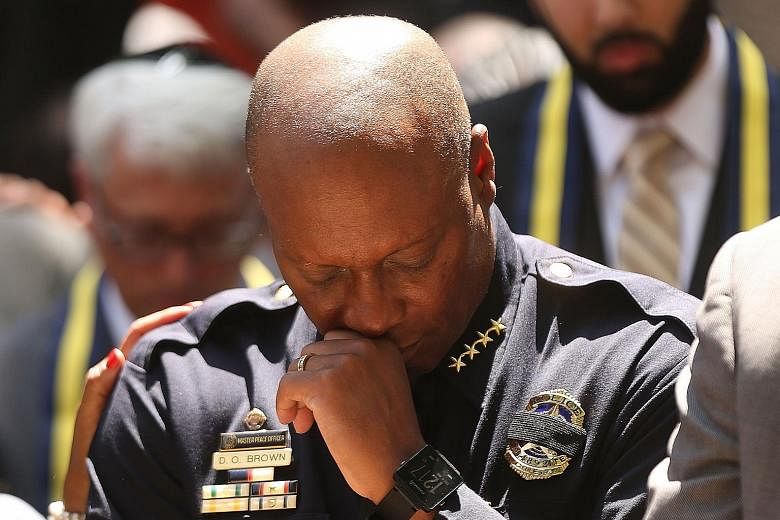DALLAS • As the US reeled from a week of violence pitting police officers against civilians, Dallas police chief David Brown came to personify the nation's trauma.
After a black army veteran killed five white officers at a peaceful march in the Texas city, the 55-year-old police chief, who is African-American, delivered a simple but poignant message: "We are heartbroken," he said.
"This must stop. This divisiveness between our police and our citizens."
Mr Brown's own story, marked by personal tragedy, encapsulates the tensions surrounding policing, race and gun violence in the US.
Shortly after Mr Brown took the helm of the Dallas police force in 2010, his 27-year-old son, David Brown Jr, fatally shot an officer and another man while high on drugs, before being killed by police.
The city's top cop and Dallas native - who was moved to join the force to confront a crack cocaine epidemic in his own inner city neighbourhood - also lost both his brother and a former police partner to gun violence.
"That man went through a lot," said Mr Ron Franklin, one of many Dallas residents paying tribute at a memorial outside police headquarters.
"I can feel his pain. He's trying to do the best that he can do."
As police chief, Mr Brown has gained national recognition for his progressive approach to law enforcement, working to cultivate more amicable relations between cops and community members.
"Police officers are guardians of this great democracy," Mr Brown said last Friday, the day after the atrocity.
"The freedom to protest, the freedom of speech, the freedom for expression. All freedoms we fight for with our lives; it's what makes us who we are as Americans."
"He's human. He understands a lot of different sides. Not just his own. Not just from a police perspective," said Ms Julie Gavran, the south-west director of the organisation Keep Guns Off Campus.
Despite facing initial internal reluctance, Mr Brown has geared the force away from violence as a first resort, training cops with simulation exercises to de-escalate confrontation without using their weapons.
Department statistics have shown a steady decline in the number of officer-involved shootings since 2012, which last year dropped to their lowest level in a decade.
"Our chief in the last couple of years has done great things to strengthen the community and the relationship with the police department," said Ms Gavran.
This increasing cooperation was evident last Thursday, as police and residents shook hands and took selfies in the hours before gunman Micah Johnson opened fire, turning the demonstration into a chaotic combat zone.
In the wake of the attack, Mr Brown came to appear, as he briefed a stunned public on the tragedy in Texas, more like a political leader than a cop.
"We are not going to let a coward who ambushed police officers change our democracy," Mr Brown said. "Our city, our country, is better than that."
AGENCE FRANCE-PRESSE

